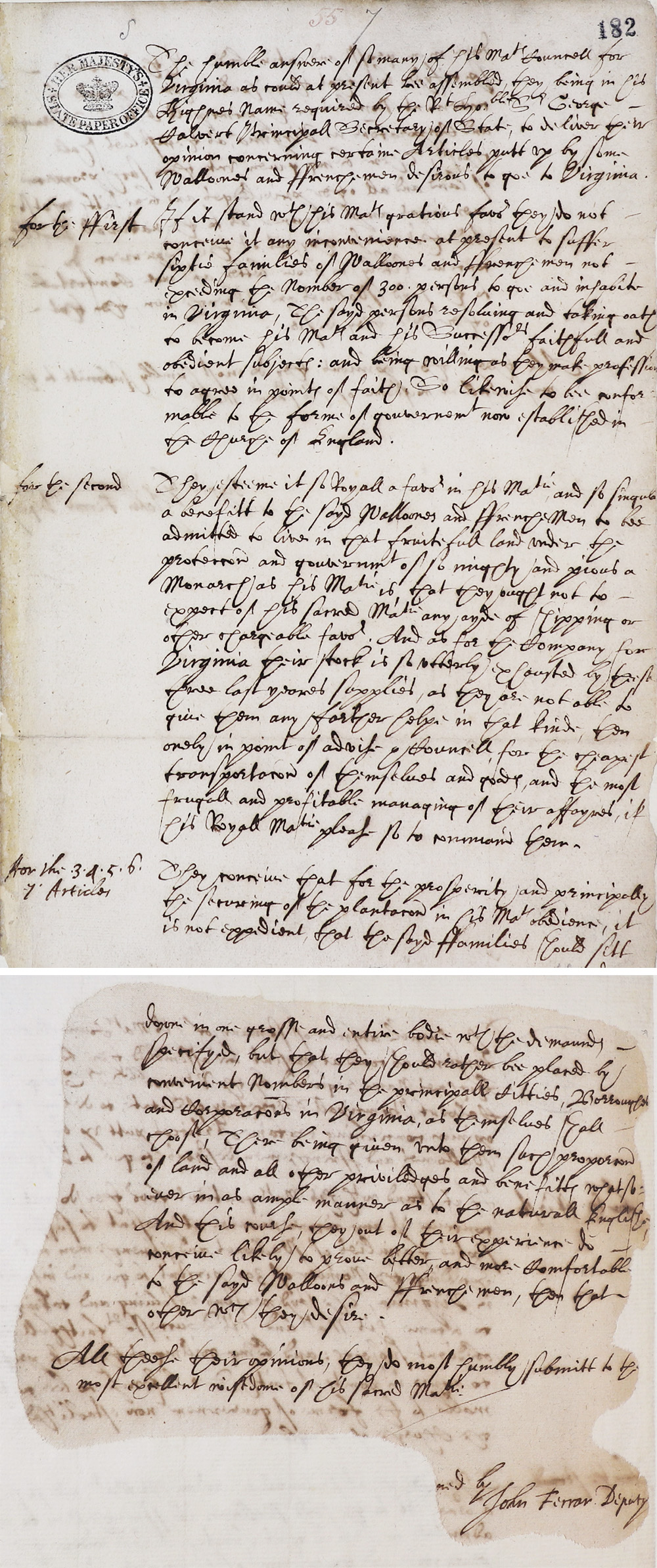
A document entitled: ‘The humble answer of so many of his majesties Councell…their opinion concerning certain Articles putt up by some Walloons and French men desirous to goe to Virginia’, 1621. Catalogue Ref: CO 1/1 f.182-3.
This is a decision from the King and his council to a request from Walloons and Frenchmen who wanted to settle in Virginia in 1621.
Transcript
The humble answer of so many of his majesty’s Councell [Council] for Virginia as could at present bee [be] appointed they being in his Highness name required by the right honourable Sir George Calvert principall [principal] Secretary of State; to deliver their opinion concerning certain Articles putt [put] up by some Walloons and French men desirous to goe [go] to Virginia.
For the first
If it stand with his majesties gracious favour they do not concern it any inconvenience at present to suffer [permit] Sixtie [sixty] families of Walloones [Walloons] and Frenchmen not exceeding the number of 300. Persons to goe [go] and inhabit in Virginia, the said persons resolving and taking oath to become his majesties and his Sucessor’s faithfull [faithful] and obedient subjects: and being willing as they make profession [declare] to agree in points of faith. So liking to bee [be] conformable to the forme [form] of gouernment [government] now established in the Church of England.
For the second
They esteeme [esteem] it so Royall [Royal] a favour in his Majesty, and so singular a benefit to the said Walloones [Walloons] and Frenchmen to bee [be] admitted to live in that fruitfull [fruitful] land under the protection and gouernment [government] of so mighty and pious a monarch as his majesty is that they ought not to expect of his sacred majesty any ayde [aid] of shipping or other of agreable [agreeable] favour. And as for the Company for Virginia their stock is so utterly exhausted by these three last yeares [years] supplies, as they are not able to give from any farther helpe [help] in that kind; then onely [only] in point of/and Councill [Council], for the cheapest transportation of themselves and goods, and the most frugal [little spending] and profitable managing of their affayres [affairs], if his Royal Majesties pleasure so to command them.
For the 3.3.4.5.6. 7. Articles
They conceive that for the prosperity and principally the servicing of the plantation in his Majesties obedience, it is not expedient [required], that the sayd families should sett [set] downe [down] [f.183] in one grosse [gross] and intire [entire] bodie [body] with the demands certified(?), but that they should rather bee [be] placed by convenient numbers in the principall Citties [cities, Borroughes [boroughs], and Corporacons [corporations] in Virginia, as the masters shall choose, there being giuen [given] unto them such proportion of land and all other priviledges [privileges] and bene [been] fitte [fit] what ever in as ample manner as to the naturall [natural] English And this course, they out of their experience do conceive likely to prove better, and more comfortable To the sayd Walloons and Frenchmen, them that other which the desire.
All these their opinions, they do most humbly submit to the most excellent wisdom of his sacred majestie [majesty].
signed by John Ferrar Deputy
- What is the decision from the King and his council to this request from Walloons and Frenchmen to settle in Virginia?
- How many families of Walloons and Frenchmen are permitted to settle in Virginia?
- What is the total number of people they will allow to settle there?
- The document states that ‘the Company in Virginia….is so utterly exhausted’. What does this suggest about the state of this English colony in in 1621?
- How might the settlement of skilled immigrants change the colony’s economy? [Clue: see professions of French Protestants and Walloons in Source 2a.]
- What are the conditions set out for the French Protestants and Walloons concerning where they can settle in Virginia?
- Can you infer the reasons for these conditions?
- This document comes from The National Archives Colonial Office collection. Why might the National Archives hold a collection of documents under this name?
- Can you explain the measures taken to preserve condition of this document by The National Archives?
